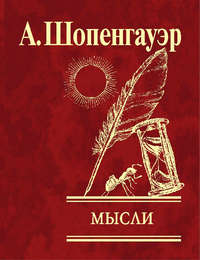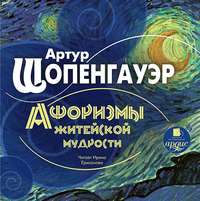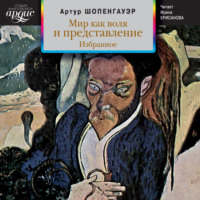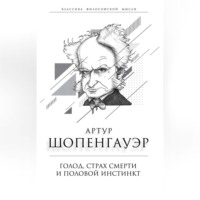 полная версия
полная версияThe World as Will and Idea (Vol. 2 of 3)
However, the law natura non facit saltus is not entirely suspended even with regard to the intellect of the brutes, though certainly the step from the brute to the human intelligence is the greatest which nature has made in the production of her creatures. In the most favoured individuals of the highest species of the brutes there certainly sometimes appears, always to our astonishment, a faint trace of reflection, reason, the comprehension of words, of thought, purpose, and deliberation. The most striking indications of this kind are afforded by the elephant, whose highly developed intelligence is heightened and supported by an experience of a lifetime which sometimes extends to two hundred years. He has often given unmistakable signs, recorded in well-known anecdotes, of premeditation, which, in the case of brutes, always astonishes us more than anything else. Such, for instance, is the story of the tailor on whom an elephant revenged himself for pricking him with a needle. I wish, however, to rescue from oblivion a parallel case to this, because it has the advantage of being authenticated by judicial investigation. On the 27th of August 1830 there was held at Morpeth, in England, a coroner's inquest on the keeper, Baptist Bernhard, who was killed by his elephant. It appeared from the evidence that two years before he had offended the elephant grossly, and now, without any occasion, but on a favourable opportunity, the elephant had seized him and crushed him. (See the Spectator and other English papers of that day.) For special information on the intelligence of brutes I recommend Leroy's excellent book, “Sur l'Intelligence des Animaux,” nouv. éd. 1802.
Chapter VI. On The Doctrine of Abstract or Rational Knowledge
The outward impression upon the senses, together with the mood which it alone awakens in us, vanishes with the presence of the thing. Therefore these two cannot of themselves constitute experience proper, whose teaching is to guide our conduct for the future. The image of that impression which the imagination preserves is originally weaker than the impression itself, and becomes weaker and weaker daily, until in time it disappears altogether. There is only one thing which is not subject either to the instantaneous vanishing of the impression or to the gradual disappearance of its image, and is therefore free from the power of time. This is the conception. In it, then, the teaching of experience must be stored up, and it alone is suited to be a safe guide to our steps in life. Therefore Seneca says rightly, “Si vis tibi omnia subjicere, te subjice rationi” (Ep. 37). And I add to this that the essential condition of surpassing others in actual life is that we should reflect or deliberate. Such an important tool of the intellect as the concept evidently cannot be identical with the word, this mere sound, which as an impression of sense passes with the moment, or as a phantasm of hearing dies away with time. Yet the concept is an idea, the distinct consciousness and preservation of which are bound up with the word. Hence the Greeks called word, concept, relation, thought, and reason by the name of the first, ὁ λογος. Yet the concept is perfectly different both from the word, to which it is joined, and from the perceptions, from which it has originated. It is of an entirely different nature from these impressions of the senses. Yet it is able to take up into itself all the results of perception, and give them back again unchanged and undiminished after the longest period of time; thus alone does experience arise. But the concept preserves, not what is perceived nor what is then felt, but only what is essential in these, in an entirely altered form, and yet as an adequate representative of them. Just as flowers cannot be preserved, but their ethereal oil, their essence, with the same smell and the same virtues, can be. The action that has been guided by correct conceptions will, in the result, coincide with the real object aimed at. We may judge of the inestimable value of conceptions, and consequently of the reason, if we glance for a moment at the infinite multitude and variety of the things and conditions that coexist and succeed each other, and then consider that speech and writing (the signs of conceptions) are capable of affording us accurate information as to everything and every relation when and wherever it may have been; for comparatively few conceptions can contain and represent an infinite number of things and conditions. In our own reflection abstraction is a throwing off of useless baggage for the sake of more easily handling the knowledge which is to be compared, and has therefore to be turned about in all directions. We allow much that is unessential, and therefore only confusing, to fall away from the real things, and work with few but essential determinations thought in the abstract. But just because general conceptions are only formed by thinking away and leaving out existing qualities, and are therefore the emptier the more general they are, the use of this procedure is confined to the working up of knowledge which we have already acquired. This working up includes the drawing of conclusions from premisses contained in our knowledge. New insight, on the contrary, can only be obtained by the help of the faculty of judgment, from perception, which alone is complete and rich knowledge. Further, because the content and the extent of the concepts stand in inverse relation to each other, and thus the more is thought under a concept, the less is thought in it, concepts form a graduated series, a hierarchy, from the most special to the most general, at the lower end of which scholastic realism is almost right, and at the upper end nominalism. For the most special conception is almost the individual, thus almost real; and the most general conception, e. g., being (i. e., the infinitive of the copula), is scarcely anything but a word. Therefore philosophical systems which confine themselves to such very general conceptions, without going down to the real, are little more than mere juggling with words. For since all abstraction consists in thinking away, the further we push it the less we have left over. Therefore, if I read those modern philosophemes which move constantly in the widest abstractions, I am soon quite unable, in spite of all attention, to think almost anything more in connection with them; for I receive no material for thought, but am supposed to work with mere empty shells, which gives me a feeling like that which we experience when we try to throw very light bodies; the strength and also the exertion are there, but there is no object to receive them, so as to supply the other moment of motion. If any one wants to experience this let him read the writings of the disciples of Schelling, or still better of the Hegelians. Simple conceptions would necessarily be such as could not be broken up. Accordingly they could never be the subject of an analytical judgment. This I hold to be impossible, for if we think a conception we must also be able to give its content. What are commonly adduced as examples of simple conceptions are really not conceptions at all, but partly mere sensations – as, for instance, those of some special colour; partly the forms of perception which are known to us a priori, thus properly the ultimate elements of perceptive knowledge. But this itself is for the whole system of our thought what granite is for geology, the ultimate firm basis which supports all, and beyond which we cannot go. The distinctness of a conception demands not only that we should be able to separate its predicates, but also that we should be able to analyse these even if they are abstractions, and so on until we reach knowledge of perception, and thus refer to concrete things through the distinct perception of which the final abstractions are verified and reality guaranteed to them, as well as to all the higher abstractions which rest upon them. Therefore the ordinary explanation that the conception is distinct as soon as we can give its predicates is not sufficient. For the separating of these predicates may lead perhaps to more conceptions; and so on again without there being that ultimate basis of perceptions which imparts reality to all those conceptions. Take, for example, the conception “spirit,” and analyse it into its predicates: “A thinking, willing, immaterial, simple, indestructible being that does not occupy space.” Nothing is yet distinctly thought about it, because the elements of these conceptions cannot be verified by means of perceptions, for a thinking being without a brain is like a digesting being without a stomach. Only perceptions are, properly speaking, clear, not conceptions; these at the most can only be distinct. Hence also, absurd as it was, “clear and confused” were coupled together and used as synonymous when knowledge of perception was explained as merely a confused abstract knowledge, because the latter kind of knowledge alone was distinct. This was first done by Duns Scotus, but Leibnitz has substantially the same view, upon which his “Identitas Indiscernibilium” depends. (See Kant's refutation of this, p. 275 of the first edition of the Critique of Pure Reason.)
The close connection of the conception with the word, thus of speech with reason, which was touched on above, rests ultimately upon the following ground. Time is throughout the form of our whole consciousness, with its inward and outward apprehension. Conceptions, on the other hand, which originate through abstraction and are perfectly general ideas, different from all particular things, have in this property indeed a certain measure of objective existence, which does not, however, belong to any series of events in time. Therefore in order to enter the immediate present of an individual consciousness, and thus to admit of being introduced into a series of events in time, they must to a certain extent be reduced again to the nature of individual things, individualised, and therefore linked to an idea of sense. Such an idea is the word. It is accordingly the sensible sign of the conception, and as such the necessary means of fixing it, that is, of presenting it to the consciousness, which is bound up with the form of time, and thus establishing a connection between the reason, whose objects are merely general universals, knowing neither place nor time, and consciousness, which is bound up with time, is sensuous, and so far purely animal. Only by this means is the reproduction at pleasure, thus the recollection and preservation, of conceptions possible and open to us; and only by means of this, again, are the operations which are undertaken with conceptions possible – judgment, inference, comparison, limitation, &c. It is true it sometimes happens that conceptions occupy consciousness without their signs, as when we run through a train of reasoning so rapidly that we could not think the words in the time. But such cases are exceptions, which presuppose great exercise of the reason, which it could only have obtained by means of language. How much the use of reason is bound up with speech we see in the case of the deaf and dumb, who, if they have learnt no kind of language, show scarcely more intelligence than the ourang-outang or the elephant. For their reason is almost entirely potential, not actual.
Words and speech are thus the indispensable means of distinct thought. But as every means, every machine, at once burdens and hinders, so also does language; for it forces the fluid and modifiable thoughts, with their infinitely fine distinctions of difference, into certain rigid, permanent forms, and thus in fixing also fetters them. This hindrance is to some extent got rid of by learning several languages. For in these the thought is poured from one mould into another, and somewhat alters its form in each, so that it becomes more and more freed from all form and clothing, and thus its own proper nature comes more distinctly into consciousness, and it recovers again its original capacity for modification. The ancient languages render this service very much better than the modern, because, on account of their great difference from the latter, the same thoughts are expressed in them in quite another way, and must thus assume a very different form; besides which the more perfect grammar of the ancient languages renders a more artistic and more perfect construction of the thoughts and their connection possible. Thus a Greek or a Roman might perhaps content himself with his own language, but he who understands nothing but some single modern patois will soon betray this poverty in writing and speaking; for his thoughts, firmly bound to such narrow stereotyped forms, must appear awkward and monotonous. Genius certainly makes up for this as for everything else, for example in Shakespeare.
Burke, in his “Inquiry into the Sublime and Beautiful,” p. 5, § 4 and 5, has given a perfectly correct and very elaborate exposition of what I laid down in § 9 of the first volume, that the words of a speech are perfectly understood without calling up ideas of perception, pictures in our heads. But he draws from this the entirely false conclusion that we hear, apprehend, and make use of words without connecting with them any idea whatever; whereas he ought to have drawn the conclusion that all ideas are not perceptible images, but that precisely those ideas which must be expressed by means of words are abstract notions or conceptions, and these from their very nature are not perceptible. Just because words impart only general conceptions, which are perfectly different from ideas of perception, when, for example, an event is recounted all the hearers will receive the same conceptions; but if afterwards they wish to make the incident clear to themselves, each of them will call up in his imagination a different image of it, which differs considerably from the correct image that is possessed only by the eye-witness. This is the primary reason (which, however, is accompanied by others) why every fact is necessarily distorted by being repeatedly told. The second recounter communicates conceptions which he has abstracted from the image of his own imagination, and from these conceptions the third now forms another image differing still more widely from the truth, and this again he translates into conceptions, and so the process goes on. Whoever is sufficiently matter of fact to stick to the conceptions imparted to him, and repeat them, will prove the most truthful reporter.
The best and most intelligent exposition of the essence and nature of conceptions which I have been able to find is in Thomas Reid's “Essays on the Powers of Human Mind,” vol. ii., Essay 5, ch. 6. This was afterwards condemned by Dugald Stewart in his “Philosophy of the Human Mind.” Not to waste paper I will only briefly remark with regard to the latter that he belongs to that large class who have obtained an undeserved reputation through favour and friends, and therefore I can only advise that not an hour should be wasted over the scribbling of this shallow writer.
The princely scholastic Pico de Mirandula already saw that reason is the faculty of abstract ideas, and understanding the faculty of ideas of perception. For in his book, “De Imaginatione,” ch. 11, he carefully distinguishes understanding and reason, and explains the latter as the discursive faculty peculiar to man, and the former as the intuitive faculty, allied to the kind of knowledge which is proper to the angels, and indeed to God. Spinoza also characterises reason quite correctly as the faculty of framing general conceptions (Eth., ii. prop. 40, schol. 2). Such facts would not need to be mentioned if it were not for the tricks that have been played in the last fifty years by the whole of the philosophasters of Germany with the conception reason. For they have tried, with shameless audacity, to smuggle in under this name an entirely spurious faculty of immediate, metaphysical, so-called super-sensuous knowledge. The reason proper, on the other hand, they call understanding, and the understanding proper, as something quite strange to them, they overlook altogether, and ascribe its intuitive functions to sensibility.
In the case of all things in this world new drawbacks or disadvantages cleave to every source of aid, to every gain, to every advantage; and thus reason also, which gives to man such great advantages over the brutes, carries with it its special disadvantages, and opens for him paths of error into which the brutes can never stray. Through it a new species of motives, to which the brute is not accessible, obtains power over his will. These are the abstract motives, the mere thoughts, which are by no means always drawn from his own experience, but often come to him only through the talk and example of others, through tradition and literature. Having become accessible to thought, he is at once exposed to error. But every error must sooner or later do harm, and the greater the error the greater the harm it will do. The individual error must be atoned for by him who cherishes it, and often he has to pay dearly for it. And the same thing holds good on a large scale of the common errors of whole nations. Therefore it cannot too often be repeated that every error wherever we meet it, is to be pursued and rooted out as an enemy of mankind, and that there can be no such thing as privileged or sanctioned error. The thinker ought to attack it, even if humanity should cry out with pain, like a sick man whose ulcer the physician touches. The brute can never stray far from the path of nature; for its motives lie only in the world of perception, where only the possible, indeed only the actual, finds room. On the other hand, all that is only imaginable, and therefore also the false, the impossible, the absurd, and senseless, enters into abstract conceptions, into thoughts and words. Since now all partake of reason, but few of judgment, the consequence is that man is exposed to delusion, for he is abandoned to every conceivable chimera which any one talks him into, and which, acting on his will as a motive, may influence him to perversities and follies of every kind, to the most unheard-of extravagances, and also to actions most contrary to his animal nature. True culture, in which knowledge and judgment go hand in hand, can only be brought to bear on a few; and still fewer are capable of receiving it. For the great mass of men a kind of training everywhere takes its place. It is effected by example, custom, and the very early and firm impression of certain conceptions, before any experience, understanding, or judgment were there to disturb the work. Thus thoughts are implanted, which afterward cling as firmly, and are as incapable of being shaken by any instruction as if they were inborn; and indeed they have often been regarded, even by philosophers, as such. In this way we can, with the same trouble, imbue men with what is right and rational, or with what is most absurd. For example, we can accustom them to approach this or that idol with holy dread, and at the mention of its name to prostrate in the dust not only their bodies but their whole spirit; to sacrifice their property and their lives willingly to words, to names, to the defence of the strangest whims; to attach arbitrarily the greatest honour or the deepest disgrace to this or that, and to prize highly or disdain everything accordingly with full inward conviction; to renounce all animal food, as in Hindustan, or to devour still warm and quivering pieces, cut from the living animal, as in Abyssinia; to eat men, as in New Zealand, or to sacrifice their children to Moloch; to castrate themselves, to fling themselves voluntarily on the funeral piles of the dead – in a word, to do anything we please. Hence the Crusades, the extravagances of fanatical sects; hence Chiliasts and Flagellants, persecutions, autos da fe, and all that is offered by the long register of human perversities. Lest it should be thought that only the dark ages afford such examples, I shall add a couple of more modern instances. In the year 1818 there went from Würtemberg 700 °Chiliasts to the neighbourhood of Ararat, because the new kingdom of God, specially announced by Jung Stilling, was to appear there.17 Gall relates that in his time a mother killed her child and roasted it in order to cure her husband's rheumatism with its fat.18 The tragical side of error lies in the practical, the comical is reserved for the theoretical. For example, if we could firmly persuade three men that the sun is not the cause of daylight, we might hope to see it soon established as the general conviction. In Germany it was possible to proclaim as the greatest philosopher of all ages Hegel, a repulsive, mindless charlatan, an unparalleled scribbler of nonsense, and for twenty years many thousands have believed it stubbornly and firmly; and indeed, outside Germany, the Danish Academy entered the lists against myself for his fame, and sought to have him regarded as a summus philosophus. (Upon this see the preface to my Grundproblemen der Ethik.) These, then, are the disadvantages which, on account of the rarity of judgment, attach to the existence of reason. We must add to them the possibility of madness. The brutes do not go mad, although the carnivora are subject to fury, and the ruminants to a sort of delirium.
Chapter VII.19 On The Relation of the Concrete Knowledge of Perception to Abstract Knowledge
It has been shown that conceptions derive their material from knowledge of perception, and therefore the entire structure of our world of thought rests upon the world of perception. We must therefore be able to go back from every conception, even if only indirectly through intermediate conceptions, to the perceptions from which it is either itself directly derived or those conceptions are derived of which it is again an abstraction. That is to say, we must be able to support it with perceptions which stand to the abstractions in the relation of examples. These perceptions thus afford the real content of all our thought, and whenever they are wanting we have not had conceptions but mere words in our heads. In this respect our intellect is like a bank, which, if it is to be sound, must have cash in its safe, so as to be able to meet all the notes it has issued, in case of demand; the perceptions are the cash, the conceptions are the notes. In this sense the perceptions might very appropriately be called primary, and the conceptions, on the other hand, secondary ideas. Not quite so aptly, the Schoolmen, following the example of Aristotle (Metaph., vi. 11, xi. 1), called real things substantiæ primæ, and the conceptions substantiæ secundæ. Books impart only secondary ideas. Mere conceptions of a thing without perception give only a general knowledge of it. We only have a thorough understanding of things and their relations so far as we are able to represent them to ourselves in pure, distinct perceptions, without the aid of words. To explain words by words, to compare concepts with concepts, in which most philosophising consists, is a trivial shifting about of the concept-spheres in order to see which goes into the other and which does not. At the best we can in this way only arrive at conclusions; but even conclusions give no really new knowledge, but only show us all that lay in the knowledge we already possessed, and what part of it perhaps might be applicable to the particular case. On the other hand, to perceive, to allow the things themselves to speak to us, to apprehend new relations of them, and then to take up and deposit all this in conceptions, in order to possess it with certainty – that gives new knowledge. But, while almost every one is capable of comparing conceptions with conceptions, to compare conceptions with perceptions is a gift of the select few. It is the condition, according to the degree of its perfection, of wit, judgment, ingenuity, genius. The former faculty, on the contrary, results in little more than possibly rational reflections. The inmost kernel of all genuine and actual knowledge is a perception; and every new truth is the profit or gain yielded by a perception. All original thinking takes place in images, and this is why imagination is so necessary an instrument of thought, and minds that lack imagination will never accomplish much, unless it be in mathematics. On the other hand, merely abstract thoughts, which have no kernel of perception, are like cloud-structures, without reality. Even writing and speaking, whether didactic or poetical, has for its final aim to guide the reader to the same concrete knowledge from which the author started; if it has not this aim it is bad. This is why the contemplation and observing of every real thing, as soon as it presents something new to the observer, is more instructive than any reading or hearing. For indeed, if we go to the bottom of the matter, all truth and wisdom, nay, the ultimate secret of things, is contained in each real object, yet certainly only in concreto, just as gold lies hidden in the ore; the difficulty is to extract it. From a book, on the contrary, at the best we only receive the truth at second hand, and oftener not at all.









